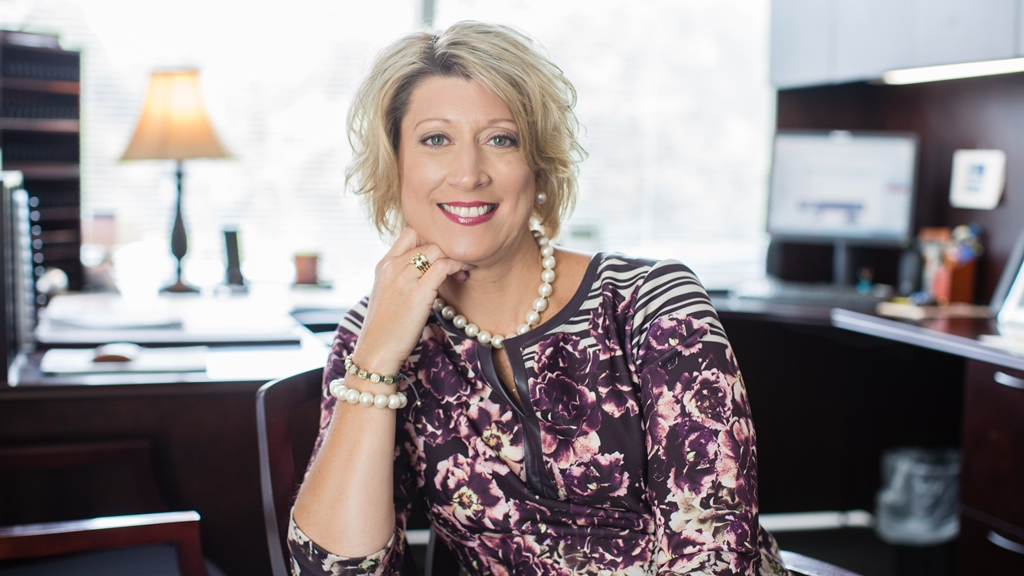Every year, students with intellectual and developmental disabilities (IDD) are among those completing high school in Tennessee. Before 2016, they didn’t always have the supports available to explore options like employment or volunteering. All too often, they just ended up staying at home with their families.
Half a decade later, the experiences of many of these students — and other Tennesseans with IDD — are often very different: they are empowered to work in a role of their choosing and build more independent lives, all thanks to the state’s Employment and Community First (ECF) CHOICES program.
We talked to Stephani Ryan, who’s lead the program since its launch, about her personal career path and the evolution of ECF CHOICES.
A leader chooses the right path
When Stephani Ryan was considering her own calling, she knew she wanted to follow her heart for serving others.
At first, she pursued nursing. But two years into that degree track, she began clinical rotations and realized that it wasn’t such a great fit after all.
“I didn’t have the ability to separate from my patients,” Stephani says.

While searching for an option that would enable her to make a more positive overall impact in people’s lives, she decided to earn a finance degree. After graduating, she entered the health insurance industry, realizing it supported access to care that was vital in achieving and maintaining overall wellbeing.
Nearly 30 years later, Stephani knows that was the right call. She now serves as vice president for BlueCare Tennessee’s long-term services and supports (LTSS) programs. Her areas of responsibility include CHOICES, which supports home and community-based services for older TennCare members and people with physical disabilities.
“CHOICES helps members and families with services and supports that allow for the safest, most meaningful life possible,” Stephani says. “Before this program, these members may have lived their later years in an institution. Thanks to CHOICES, they have options that include day programs, in-home care and living in group home settings that allow for greater independence.”
Evolving to meet a need
In 2015, the Division of TennCare leadership recognized an opportunity to build on the success of CHOICES. They reached out to the BlueCare team to launch a pilot that would support greater independence — up to and including integrated competitive employment — for younger IDD members in the state.
BlueCare went live with the Employment and Community First (ECF) CHOICES program in 2016, with 13 different services designed to meet members where they are and help them find fulfilling, engaging work.
“A lot of these IDD members found themselves as high school graduates asking, ‘Now what?’ and ECF helped answer that question,” Stephani says. “Someone may have already had an idea in mind, and thanks to the program, they were finally able to explore that option.”
Where the original CHOICES launched with thousands of members, the uniquely targeted ECF program focused on a much smaller population.
Even so, BlueCare brought on many new employees with the specific backgrounds and experience to provide the types of support needed by the new program’s members.

How ECF CHOICES works
An ongoing interview series helps support coordinators understand a member’s interests, abilities, dreams and desires — and how those things evolve with time and experience. Support coordinators use these insights to create and maintain a person-centered support plan aimed at achieving a particular member’s concrete goals. These goals often include things like:
- Driving
- Living on one’s own
- Getting a job or volunteer position
Other ECF services focus on developing life skills that support a member’s self-sufficiency or help them engage with the community.
“Ultimately, these [services] reduce dependence on individual or paid support,” Stephani says. “And all these services are available from Day One of enrollment, enabling ECF to immediately improve members’ lives.”
Project SEARCH adds another dimension
In 2018, employees were able to see the positive impact of ECF-type services firsthand when BlueCross welcomed the inaugural class of the Project SEARCH program to the Chattanooga campus.
Project SEARCH offers high school graduates with intellectual or learning disabilities the chance to earn valuable, real-world work experience. The program was a great success and expanded to include more participants the following year. Several participants have been hired at BlueCross, while others have found work at organizations in their communities.

“Project SEARCH helped open our eyes to what high-functioning people with IDD are capable of,” Stephani says. “The value that they bring is real. Everyone benefits from interacting with them and having them on campus.”
Coping with COVID-19
In March 2020, everything changed. With the BlueCross campuses shut down for all but lights-on workers, the Project SEARCH on-site program was suspended. Support coordinators transitioned overnight to engaging ECF members in a virtual world, using a combination of texts, FaceTime and video chats to stay connected.
“We had COVID fatigue all around,” Stephani says. “Our employees are special folks with a passion for seeing members, and the coordinators become, in many cases, a big part of these members’ lives — almost like family. It was hard not to have that in-person connection.”
While some members elected to put services on hold, the BlueCare ECF CHOICES team worked hard to keep people going in their respective programs.
“Despite all of the challenges, the percentage of employed ECF members didn’t fluctuate a lot during the pandemic,” Stephani says. “Many of these members have such pride in their jobs, they chose to keep working.”

Returning to a ‘new normal’
With the pandemic easing, many members who paused employment are coming back — with new ambitions and a fresh sense of purpose. Stephani shared the story of one member who worked in inventory at a department store and decided to quit for safety’s sake when COVID-19 struck.
“Once she and her family were vaccinated, she reapplied to her store — they immediately took her back, because she was widely known as one of their best employees,” Stephani says. “She asked for more hours, and she and her supervisors are working toward her goal to become a cashier.”
The BlueCross Project SEARCH program also has an encouraging update – class selection is underway and participants are expected to return to the Chattanooga campus later this year.
Looking to the future
There’s another bright spot on the horizon: a proposal to expand ECF membership post-pandemic as state finances return to normal. There are also plans to implement the ECF model of home and community-based services for individuals receiving similar services, who are currently directly supported by the state.
“ECF proved very successful — the program achieved its every goal and has a significant waiting list for enrollment,” Stephani says. “Moving more people into these services and supports that can change their lives for the better will be amazing.”
The BlueCare teams serving LTSS members are strengthening their commitment to excellence as they pursue a Network Accreditation designation from The Council on Quality and Leadership (CQL). This multi-year accreditation process will help BlueCare go above and beyond in ensuring members with intellectual and developmental disabilities receive the most effective support to reach their personal goals.
Witnessing the journey
For Stephani, the most eye-opening and rewarding element is seeing a member’s journey from uncertainty to self-confidence — a journey that often involves family.
“In so many situations, parents/guardians thought their loved one would never be able to work,” Stephani says. “To see these families place their trust in the program and then see their loved one living their dreams … there’s nothing like it.”
“Those success stories never get old.”


 Alison has been a member of the BlueCross BlueShield of Tennessee corporate communications team since 2015. A Chattanooga native, she has more than 15 years of health care communications experience including writing, editing, public relations and social media.
Alison has been a member of the BlueCross BlueShield of Tennessee corporate communications team since 2015. A Chattanooga native, she has more than 15 years of health care communications experience including writing, editing, public relations and social media.